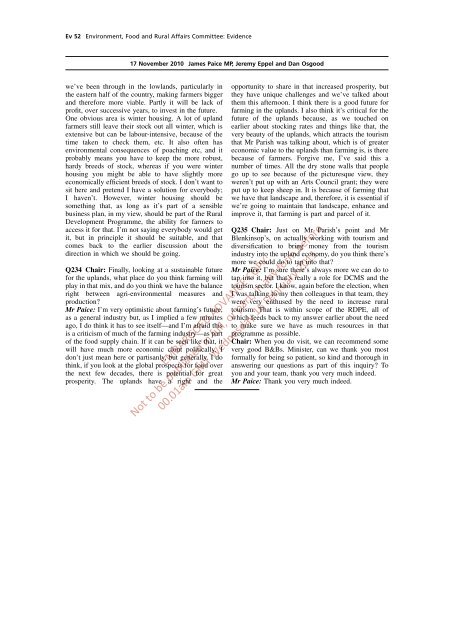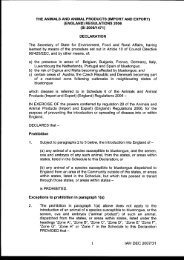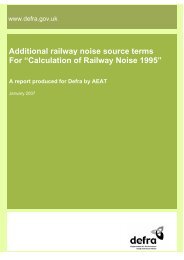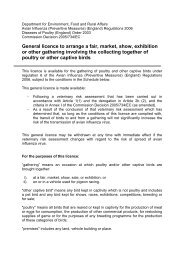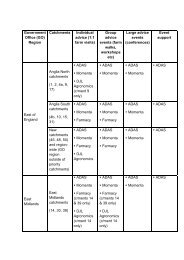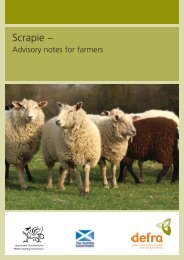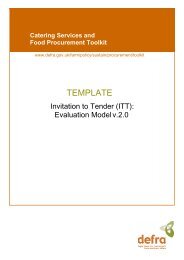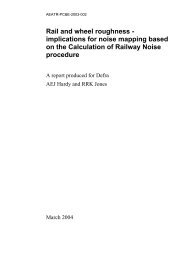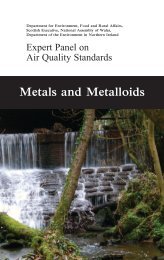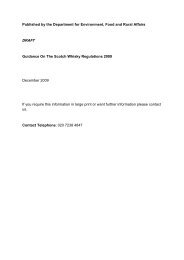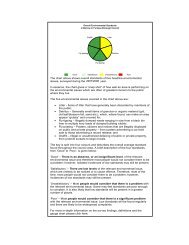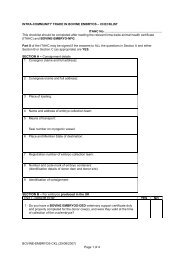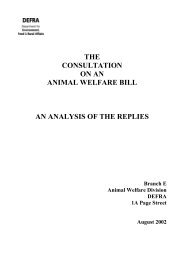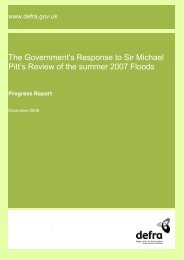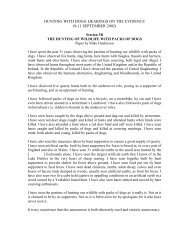Farming in the Uplands - ARCHIVE: Defra
Farming in the Uplands - ARCHIVE: Defra
Farming in the Uplands - ARCHIVE: Defra
You also want an ePaper? Increase the reach of your titles
YUMPU automatically turns print PDFs into web optimized ePapers that Google loves.
Ev 52 Environment, Food and Rural Affairs Committee: Evidence<br />
17 November 2010 James Paice MP, Jeremy Eppel and Dan Osgood<br />
we’ve been through <strong>in</strong> <strong>the</strong> lowlands, particularly <strong>in</strong><br />
<strong>the</strong> eastern half of <strong>the</strong> country, mak<strong>in</strong>g farmers bigger<br />
and <strong>the</strong>refore more viable. Partly it will be lack of<br />
profit, over successive years, to <strong>in</strong>vest <strong>in</strong> <strong>the</strong> future.<br />
One obvious area is w<strong>in</strong>ter hous<strong>in</strong>g. A lot of upland<br />
farmers still leave <strong>the</strong>ir stock out all w<strong>in</strong>ter, which is<br />
extensive but can be labour-<strong>in</strong>tensive, because of <strong>the</strong><br />
time taken to check <strong>the</strong>m, etc. It also often has<br />
environmental consequences of poach<strong>in</strong>g etc, and it<br />
probably means you have to keep <strong>the</strong> more robust,<br />
hardy breeds of stock, whereas if you were w<strong>in</strong>ter<br />
hous<strong>in</strong>g you might be able to have slightly more<br />
economically efficient breeds of stock. I don’t want to<br />
sit here and pretend I have a solution for everybody;<br />
I haven’t. However, w<strong>in</strong>ter hous<strong>in</strong>g should be<br />
someth<strong>in</strong>g that, as long as it’s part of a sensible<br />
bus<strong>in</strong>ess plan, <strong>in</strong> my view, should be part of <strong>the</strong> Rural<br />
Development Programme, <strong>the</strong> ability for farmers to<br />
access it for that. I’m not say<strong>in</strong>g everybody would get<br />
it, but <strong>in</strong> pr<strong>in</strong>ciple it should be suitable, and that<br />
comes back to <strong>the</strong> earlier discussion about <strong>the</strong><br />
direction <strong>in</strong> which we should be go<strong>in</strong>g.<br />
Q234 Chair: F<strong>in</strong>ally, look<strong>in</strong>g at a susta<strong>in</strong>able future<br />
for <strong>the</strong> uplands, what place do you th<strong>in</strong>k farm<strong>in</strong>g will<br />
play <strong>in</strong> that mix, and do you th<strong>in</strong>k we have <strong>the</strong> balance<br />
right between agri-environmental measures and<br />
production?<br />
Mr Paice: I’m very optimistic about farm<strong>in</strong>g’s future,<br />
as a general <strong>in</strong>dustry but, as I implied a few m<strong>in</strong>utes<br />
ago, I do th<strong>in</strong>k it has to see itself—and I’m afraid this<br />
is a criticism of much of <strong>the</strong> farm<strong>in</strong>g <strong>in</strong>dustry—as part<br />
of <strong>the</strong> food supply cha<strong>in</strong>. If it can be seen like that, it<br />
will have much more economic clout politically. I<br />
don’t just mean here or partisanly, but generally. I do<br />
th<strong>in</strong>k, if you look at <strong>the</strong> global prospects for food over<br />
<strong>the</strong> next few decades, <strong>the</strong>re is potential for great<br />
prosperity. The uplands have a right and <strong>the</strong><br />
opportunity to share <strong>in</strong> that <strong>in</strong>creased prosperity, but<br />
<strong>the</strong>y have unique challenges and we’ve talked about<br />
<strong>the</strong>m this afternoon. I th<strong>in</strong>k <strong>the</strong>re is a good future for<br />
farm<strong>in</strong>g <strong>in</strong> <strong>the</strong> uplands. I also th<strong>in</strong>k it’s critical for <strong>the</strong><br />
future of <strong>the</strong> uplands because, as we touched on<br />
earlier about stock<strong>in</strong>g rates and th<strong>in</strong>gs like that, <strong>the</strong><br />
very beauty of <strong>the</strong> uplands, which attracts <strong>the</strong> tourism<br />
that Mr Parish was talk<strong>in</strong>g about, which is of greater<br />
economic value to <strong>the</strong> uplands than farm<strong>in</strong>g is, is <strong>the</strong>re<br />
because of farmers. Forgive me, I’ve said this a<br />
number of times. All <strong>the</strong> dry stone walls that people<br />
go up to see because of <strong>the</strong> picturesque view, <strong>the</strong>y<br />
weren’t put up with an Arts Council grant; <strong>the</strong>y were<br />
put up to keep sheep <strong>in</strong>. It is because of farm<strong>in</strong>g that<br />
we have that landscape and, <strong>the</strong>refore, it is essential if<br />
we’re go<strong>in</strong>g to ma<strong>in</strong>ta<strong>in</strong> that landscape, enhance and<br />
improve it, that farm<strong>in</strong>g is part and parcel of it.<br />
Q235 Chair: Just on Mr Parish’s po<strong>in</strong>t and Mr<br />
Blenk<strong>in</strong>sop’s, on actually work<strong>in</strong>g with tourism and<br />
diversification to br<strong>in</strong>g money from <strong>the</strong> tourism<br />
<strong>in</strong>dustry <strong>in</strong>to <strong>the</strong> upland economy, do you th<strong>in</strong>k <strong>the</strong>re’s<br />
more we could do to tap <strong>in</strong>to that?<br />
Mr Paice: I’m sure <strong>the</strong>re’s always more we can do to<br />
tap <strong>in</strong>to it, but that’s really a role for DCMS and <strong>the</strong><br />
tourism sector. I know, aga<strong>in</strong> before <strong>the</strong> election, when<br />
I was talk<strong>in</strong>g to my <strong>the</strong>n colleagues <strong>in</strong> that team, <strong>the</strong>y<br />
were very enthused by <strong>the</strong> need to <strong>in</strong>crease rural<br />
tourism. That is with<strong>in</strong> scope of <strong>the</strong> RDPE, all of<br />
which feeds back to my answer earlier about <strong>the</strong> need<br />
to make sure we have as much resources <strong>in</strong> that<br />
programme as possible.<br />
Chair: When you do visit, we can recommend some<br />
very good B&Bs. M<strong>in</strong>ister, can we thank you most<br />
formally for be<strong>in</strong>g so patient, so k<strong>in</strong>d and thorough <strong>in</strong><br />
answer<strong>in</strong>g our questions as part of this <strong>in</strong>quiry? To<br />
you and your team, thank you very much <strong>in</strong>deed.<br />
Mr Paice: Thank you very much <strong>in</strong>deed.<br />
EMBARGOED ADVANCE COPY:<br />
Not to be published <strong>in</strong> full, or part, <strong>in</strong> any form before<br />
00.01am GMT Wednesday 16 February 2011


